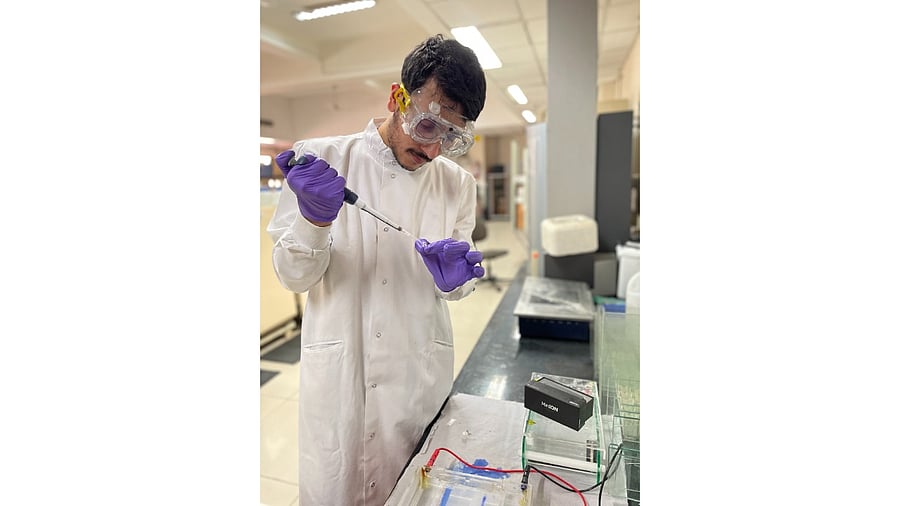
A research scholar performing whole genome sequencing of LSDV
Photo Credit: IISc
Bengaluru: Scientists investigating the lumpy skin disease outbreak in India – that has since 2022 killed over one lakh cattle – have traced its severity to an unusually large number of genetic variations in the Lumpy Skin Disease Virus (LSDV) strain. The outbreak severely affected India's agricultural sector and caused staggering economic losses.
A multi-institutional team of scientists found over 1,800 genetic variations that included a large number of variations in viral genes critical for binding to host cells, evading immune response, and replicating efficiently. This is likely to have enhanced the virus’s ability to cause disease. Their study was published in BMC Genomics.
"Cattle developed more severe symptoms in areas where we found highly diverse strains. This suggests that the genetic variations could elevate virulence," Ankeet Kumar, PhD student at the Indian Institute of Science (IISc) and co-lead author of the study, said.
The team collected skin nodules, blood, and nasal swabs from infected cattle in states including Gujarat, Maharashtra, Rajasthan, and Karnataka, in collaboration with veterinary institutes and performed advanced whole-genome sequencing of DNA, extracted from 22 samples.
Kumar said the lack of an established LSDV genome sequencing and analysis pipeline posed a serious challenge, forcing the team to adapt techniques from COVID-19 research.
The genomic analysis revealed two distinct LSDV variants circulating in India, one with a low and another with a high number of genetic variations; the latter turned out to be similar to LSDV strains from a 2015 outbreak in Russia.
Kumar said there were no previous reports of such highly varied LSDV strains in India. Viruses with DNA as the genetic material, like LSDV, are generally more stable than RNA viruses. “Therefore, finding so many genetic variations was quite surprising, and could explain the severity of the disease,” he said.
Insights from the study can help improve diagnostics, vaccines, and interventions to fight emerging infectious diseases that threaten livestock, IISc said.
Utpal Tatu, Professor in IISc’s Department of Biochemistry and team member, said the genomic data would prove “invaluable” for vaccine development by revealing molecular hotspots and genetic variations to target. His research group conducted similar studies on COVID-19 during the pandemic. “This is a first for characterising the genomic landscape of LSDV during India's outbreak on a national scale,” he said.
IISc said the study represented an example of the One Health approach in which multidisciplinary teams, including molecular biologists, computational experts, and veterinary doctors come together to address issues of national relevance.
A viral infection caused by the LSDV, the disease is transmitted by insects like flies and mosquitoes. It causes fever and skin nodules, and can be fatal for cattle. The virus, confined to the sub-African region until 1989, later spread to the Middle East, Russia and other southeast European nations, and South Asia. India has reported two major outbreaks, in 2019 and 2022. The latter infected more than two million cows.